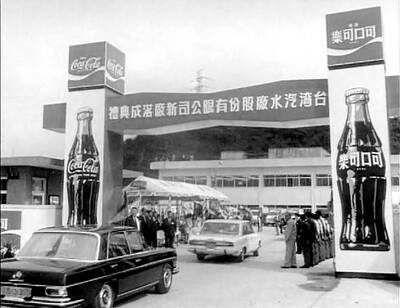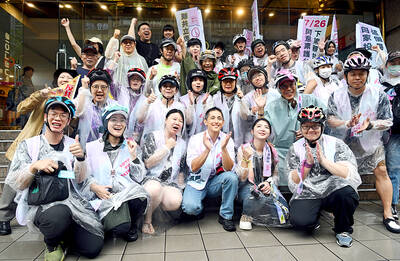Asia’s biggest games exhibition, the Taipei Game Show (台北國際電玩展) was as enjoyable as ever, but it ended last week on a relatively anticlimactic note.
Ordinarily, the annual event at the Taipei World Trade Center is brimming with news of fresh consoles and developments in the hardware industry. This year, however, the real developments of interest were more subtle than usual and required some digging to discover.
Attendees hoping for new console announcements were, of course, disappointed, since all of the main machines have at least three years shelf life left in them. On the plus side, the biggest thing to come out of the show was the impression that the country’s game developers might start to live up to expectations within the next few years.
TAIWANESE GAMES DEVELOPERS
The first thing I noticed was that the Taiwanese games development scene is finally showing signs of maturing. Usually, a smattering of low-quality Taiwan-made titles can be found at the show if you look hard enough, but nothing of the quality one would assume tech-savvy Taiwan would be capable of producing. This year Taiwan-based games development houses had a much higher profile, and the quality of their products had improved significantly.
While playing one of Taipei-based Thirty Inc’s titles, I spoke with a representative about the company’s latest cel-shaded online shooter, GOGOGO (go.iplayer.com.tw). It has in-game advertising based on real Taiwanese products and graphics modeled after Taipei landmarks, as well as decent game play. GOGOGO feels quite nice, and should be an indicator of what to expect from Thirty Inc and other newly formed studios.
NINTENDO
Shockingly, Nintendo’s presence at the show was almost non-existent, with just a few stalls here and there advertising Wii games on projectors that were far too bright.
Never had I seen such a clear distinction between so-called hardcore and casual gaming. There were rows of PlayStation and Xbox machines with queues 100m long and excited gamers exploding creatures with plasma rifles, but at Nintendo’s stalls? One or two people awkwardly waving a Wii pad around trying to make a virtual go-kart turn a corner. Perhaps it should not come as a surprise that the majority of people at these shows are more interested in the PlayStation and Xbox than Nintendo’s Wii. While the Wii sells like hot cakes, keeps you fit and trains your brain, there is something altogether less exhilarating about the Wii gaming experience — and this was all the more apparent at the massive, crowded and chaotic Taipei Game Show.
SONY
Perhaps Nintendo had given up by the time I arrived, but it was certainly interesting to see how far Sony pushed the boundaries. Sony had an actual PlayStation store at the show, and visiting it felt like walking into a real shop among all of the madness. Inside, gamers were treated to exclusives including Resident Evil 5 and Street Fighter 4 and a host of new titles such as the latest Katamari Damacy. There was also a Sony “Home” store where gamers could wander through Sony’s new online chat room Home.
Another shocker from Sony was the availability of a PlayStation 3 console with Metal Gear Solid 4 for a relatively low NT$9,900 — an almost 50-percent discount and one that is no doubt needed considering the cost of the Xbox and Wii.
How could Sony possibly cut the price of this monolith of gargantuan power down to such an insanely low level? I spoke to the retailer as he shouted and slapped an advert to attract customers’ attention, and he told me it was a “low-specification” PS3 manufactured by a Taiwan-based company under official license from Sony.
It was hard to quantify exactly what he meant by low-specification, but I’m pretty sure it was simply a 40-gigabyte version, with no PS2 compatibility and more Taiwanese hardware under the hood than usual. An interesting move, especially considering Sony’s usual Japan-based production lines, and one that should shift many more PS3s globally.
MICROSOFT
Microsoft is never one to be shy at a games show and it had a domineering presence at this one, with Xbox 360s all over the convention space and tiny orange stools for gamers to perch on as they played the latest Xbox exclusives such as the excellent Grand Theft Auto IV: The Lost and Damned, Mirror’s Edge, Viva Pinata, Gears of War 2 and Street Fighter II Turbo HD Remix.
TAIWANESE HARDWARE
Last but not least was a large section dominated by Taiwanese hardware companies, most notably a 3C
(燦坤) stall that felt almost like one of the retailer’s many stores that are scattered across Taipei. It was hardly surprising that a company like 3C would get involved, and this probably did more for its reputation than sales, since the booth offered pretty much nothing different than an actual 3C shop. Perhaps visitors from other countries could have taken this opportunity to load up on “cheap” Taiwanese hardware, though I saw little evidence of any non-Asian showgoers.
Gareth Murfin is a freelance mobile and iPhone developer: www.garethmurfin.co.uk

July 28 to Aug. 3 Former president Chiang Kai-shek (蔣介石) reportedly maintained a simple diet and preferred to drink warm water — but one indulgence he enjoyed was a banned drink: Coca-Cola. Although a Coca-Cola plant was built in Taiwan in 1957, It was only allowed to sell to the US military and other American agencies. However, Chiang’s aides recall procuring the soft drink at US military exchange stores, and there’s also records of the Presidential Office ordering in bulk from Hong Kong. By the 1960s, it wasn’t difficult for those with means or connections to obtain Coca-Cola from the

No one saw it coming. Everyone — including the Chinese Nationalist Party (KMT) — expected at least some of the recall campaigns against 24 of its lawmakers and Hsinchu Mayor Ann Kao (高虹安) to succeed. Underground gamblers reportedly expected between five and eight lawmakers to lose their jobs. All of this analysis made sense, but contained a fatal flaw. The record of the recall campaigns, the collapse of the KMT-led recalls, and polling data all pointed to enthusiastic high turnout in support of the recall campaigns, and that those against the recalls were unenthusiastic and far less likely to vote. That

Taiwan is today going to participate in a world-first experiment in democracy. Twenty-four Chinese Nationalist Party (KMT) lawmakers will face a recall vote, with the results determining if they keep their jobs. Some recalls look safe for the incumbents, other lawmakers appear heading for a fall and many could go either way. Predictions on the outcome vary widely, which is unsurprising — this is the first time worldwide a mass recall has ever been attempted at the national level. Even meteorologists are unclear what will happen. As this paper reported, the interactions between tropical storms Francisco and Com-May could lead to

A couple of weeks ago the parties aligned with the People’s Republic of China (PRC), the Chinese Nationalist Party (KMT) and the Taiwan People’s Party (TPP), voted in the legislature to eliminate the subsidy that enables Taiwan Power Co (Taipower) to keep up with its burgeoning debt, and instead pay for universal cash handouts worth NT$10,000. The subsidy would have been NT$100 billion, while the cash handout had a budget of NT$235 billion. The bill mandates that the cash payments must be completed by Oct. 31 of this year. The changes were part of the overall NT$545 billion budget approved